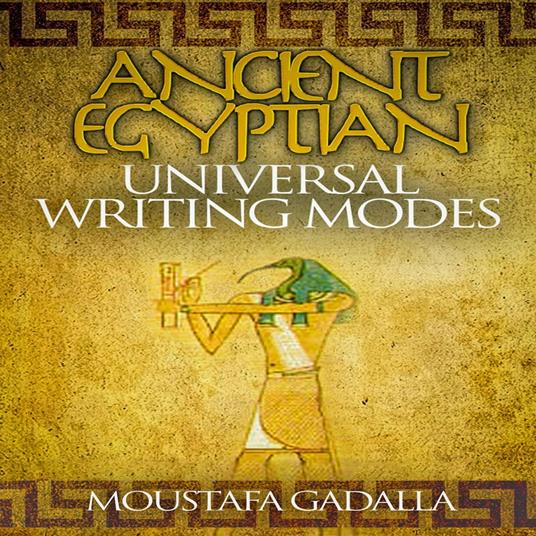Ancient Egyptian Universal Writing Modes
SHORT DESCRIPTION This book will show how the Egyptians had various modes of writings for various purposes, and how the Egyptian modes were falsely designated as “separate languages” belonging to others; the falsehood of having different languages on the Rosetta (and numerous other similar) Stone; and evaluation of the “hieratic’ and “demotic” forms of writing. The book will also highlight how the Egyptian alphabetical language is the MOTHER and origin of all languages (as confirmed by all writers of antiquities) and how this one original language came to be called Greek, Hebrew, Arabic and other ‘languages’ throughout the world through the deterioration of sound values via ‘sound shifts’, as well as foreign degradation of the original Egyptian writing forms. LONG DESCRIPTION This book will show that the Egyptian Alphabetical language is the MOTHER and origin of all languages; and how it was diffused to become other ‘languages’ throughout the world. It is the aim of this book to provide such an exposition: one which, while based on sound scholarship, will present the issues in language comprehensible to non-specialist readers. Technical terms have been kept to a minimum. These are explained, as non-technically as possible, in the glossary. The book is divided into seven parts with a total of 24 chapters, as follows: Part I. Denial, Distortion and Diversion has 3 chapters—Chapters 1 to 3: Chapter 1: The Archetypal Primacy of The Egyptian Alphabet will show the role and remote history of alphabetical letter-forms writing in Ancient Egypt prior to any other place on Earth. Chapter 2: The Concealment of The Supreme Egyptian Alphabet will show the incredible Western academia scheme to conceal the Ancient Egyptian alphabetical letter-forms from its prominent position in the history of writing. Chapter 3: The Diversion of A Proto-Sinaitic “Phoenician Connection” will uncover all the facts about having “Phoenicians” as the inventor of alphabets on Egyptian soil! Part II. Formation and Forms of Egyptian Alphabetic Writings has 6 chapters—Chapters 4 to 9: Chapter 4: Genesis of Egyptian Alphabetic Letters/Writing will refute the unfounded obsession that alphabetical letter-forms were derived from pictures; and will explore the differences between ideograms, signs and alphabetical writing. Chapter 5: The Egyptian Sound Organization of Letters will cover the primary three vowels as the originators of all vowel sounds and associated consonants. Chapter 6: The Egyptian Alphabetic Writing Styles will sort out the present common confusion of Ancient Egyptian styles of writing and set the two primary styles as uncials and cursive. Chapter 7: The Profession of Egyptian Scribes will cover the range of Egyptian writings; the profession of scribes; writing surfaces and instruments; and the documentation of official missions by Egyptian scribes. Chapter 8: Multiple Writing Forms of a Single Document will cover the commonality of having several styles of the same language on a single document; and will give examples of multiple writing forms on Egyptian magical divination papyri as well as on Egyptian stelae. Chapter 9: Multiple Writing Forms of The Rosetta Stone will expose the total misrepresentation of the three Egyptian writing forms on the Rosetta Stone as (incorrectly) being Egyptian and “Greek”! Part III. How The One World Language Became The Many has five chapters—Chapters 10 to 14: Chapter 10: The Beacon of the Ancient World will cover Egyptian settlements throughout the world; Ancient Egypt and The Seven Seas; Ancient Egypt as the world economic engine; the dominant Egyptian language; and the Egyptian Mother language of all language families. Chapter 11: Common Characteristics of Ancient Egyptian Alphabetic Writing System will detail such characteristics. Chapter 12: Letter-forms Divergence of World Alphabets From Its Egyptian Origin will cover the apparent variations of alphabetical letter-forms in world alphabets from its Egyptian origi
-
Autore:
-
Narratore:
-
Durata in (hh:mm:ss):11:11:24
-
Anno edizione:2021
Formato:
Gli Audiolibri venduti dal nostro sito sono in formato MP3 e protetti da un DRM proprietario Kobo.
Compatibilità:
Gli Audiolibri venduti dal nostro sito possono essere ascoltati sul tuo smartphone o tablet tramite la APP gratuita Kobo Books scaricabile da iOS o Android. Gli Audiolibri non possono essere scaricati in locale o trasferiti su un client di ascolto diverso da quello fornito tramite Kobo. Non è possibile ascoltare gli audiolibri con la Kobo APP Desktop. Puoi ascoltare gli Audiolibri tramite determinati eReader Kobo, utilizzando cuffie o casse con Bluetooth. Visita la pagina degli eReader per avere maggiori dettagli.
Cloud:
Gli Audiolibri venduti singolarmente dal nostro sito sono immediatamente sincronizzati sul tuo account personale in automatico. Successivamente all'acquisto, sono subito disponibili all'ascolto tramite i client di lettura Kobo compatibili.
Clicca qui servissero ulteriori informazioni



